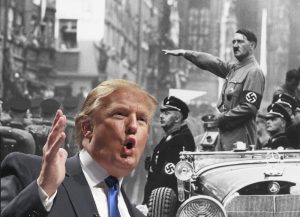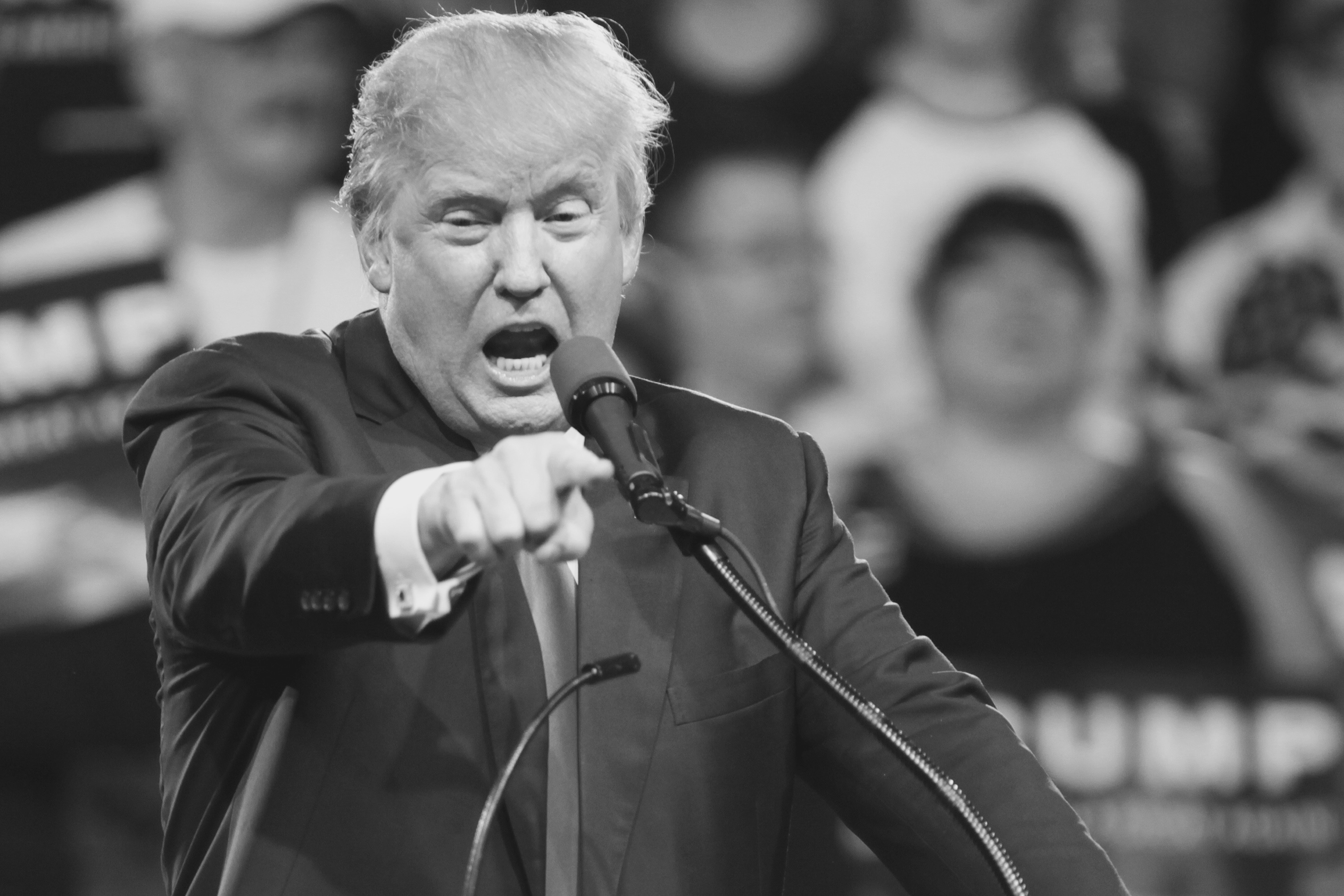We need to understand the past in order to not repeat the same mistakes today
While it might seem like a bit of a stretch to compare the orchestrator of a mass murder with a closed-minded demagogue, there is no question that a few similarities can be drawn between the ideas of both men.
While many people, especially here in Canada, think it’s comical Donald Trump is even considered to be a candidate for President of the United States, he has gotten as far as being the Republican nominee, and that’s saying something.
Not only that, but current projections estimate Trump and Clinton are currently tied in the polls, with each claiming 46 per cent of the popular vote, according to new data from the ABC News/Washington Post poll.
Since these politics are taking place in a country other than my own and so I have no say in the results, I take it as an opportunity to really observe what is going on.
After watching the three presidential debates and reading many articles on Trump’s different speeches and ideas, I could not help myself from comparing him to an infamous dictator I read so much about in my youth—Adolf Hitler.
Throughout elementary and high school, there was something about World War II and the Holocaust that really intrigued me. I love history in general, but there was something about this specific historical event that always drew me in a little more than others—the bookshelf in my room with over 40 World War II history books demonstrates this.
It’s no surprise, then, that a decent portion of my readings discussed, or at least mentioned a man named Hitler. This led me to do more extensive research on this man so many people despised.
When Hitler and the Nazi Party rose to power in Germany in the early 1930s, he promised to rescue Germany from economic and cultural disparity and restore the country to its full glory.
After the Germans were defeated in World War I, the country collapsed and, with the signing of the Treaty of Versailles in 1919, the war was officially over.

Photo courtesy of JFX-Gillis from Creative Commons.
Germany was forced to pay reparations, reduce its army and navy, surrender significant weapons, aircrafts and tanks, as well as part of its territory and its overseas colonies. The country and its people were humiliated and devastated.
This was the perfect scenario for a ‘saviour’ to rise up and promise the rebuilding and strengthening of the country and its people. Germans needed a leader to rescue them, and the well-spoken, passionate Adolf Hitler was more than willing to be that leader. Ring any bells?
This is where the toupee-wearing billionaire comes in.
At a time when terrorism plagues the United States and safety is a huge concern, Donald Trump comes to the rescue. With the widely popularized slogan “Make America Great Again,” Republican nominee Donald J. Trump promises to rebuild and strengthen the United States—and clearly this has appealed to many, considering his current position as the next possible President of the United States.
His platform is filled with propaganda, and Trump is promising to introduce a tax plan that would benefit the top 0.1 per cent, according to The Atlantic. He’s also promised to build a wall along the U.S.-Mexican border, impose tariffs on goods made in China and, most frequently mentioned, defeat ISIS.
While Nazi Germany and today’s U.S. are definitely not the same, there is no doubt Trump is using fear tactics, such as stating that immigrants are the prime source of violence in America, according to the New York Times. These fear tactics are used to gain supporters and polarize the country, much like Hitler did. Some people are scared and, whether their fears are irrational or not, a large number of U.S. citizens are clearly happy to have someone like Trump speaking up for them.
Now if we look at Hitler and Trump’s scapegoating tactics, we can see some chilling similarities regarding a specific race and/or religion.
It is widely known and documented that Hitler used his hatred of Jewish people to his advantage during his time in power. The Jewish became a scapegoat and he blamed all of Germany’s problems on them. Yet, while the Holocaust was a heinous act of inhumanity, it did not start that way.
Hitler first started persecuting Jews by ostracizing them from the rest of society as soon as he came to power in 1933. Building upon centuries of anti-Semitism, the Nazis slowly passed a number of anti-Jewish decrees, which prevented Jews from going to public parks, cinemas, restaurants and even swimming pools. These restrictions increased until eventually the Jewish people were denied their basic rights, stripped of their citizenship and forced to wear a yellow Star of David, according to the British Library archives.
What’s eerie to me is the fact that Donald Trump publicly suggested that Muslim citizens should be logged in a database and required to carry special identification, according to The Guardian. Whether or not Trump’s motives behind this statement have to do with fighting ISIS and terrorism, I am quite certain that discriminating against an entire religion is not the right way to go about it.
Whether or not Trump is like Hitler is not the main reason for my writing this article. I believe it is important to look at and understand what has happened in the past, as a way of stopping the human race from repeating history. While some of Trump’s ideas might not seem so bad, it is also significant to understand that everything, no matter how bad, starts somewhere. This is all the more reason why we should not turn a blind eye at the beginning. Remember that.





There are a few problems with this text.
For one, you fail to mention the main reason why the Jews were persecuted, namely, the German Revolution of 1918 which was orchestrated by Jewish rebels and almost destroyed the country. Trump also has a reason for his banning immigrants (whether it is as big a problem as Trump claims it is, is another discussion). As such, you make both actions sound like the work of a maniac, when at most they are exaggerated reactions to a difficult problem.
Then, you speak as if banning a certain demographic is unheard of, when Obama also banned immigrants from the Middle East (and quite rightfully, as it was a matter of security) six times during his period.
Finally, it’s ridiculous and irresponsible that you spend a whole article explaining why Trump is similar to Hitler in some aspects, and then go on to say that you don’t want to compare Trump to Hitler.
This is best homoerotic work I have ever read.
Very well said Mr. Matthews.